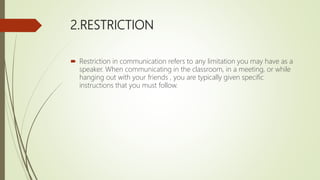7 communicative strategies
- 2. 1.NOMINATION ? A Speaker carries out nomination to collaboratively and productively establish a topic. Basically, when you employ this strategy, you try to open a topic with the people you are talking to.
- 3. 2.RESTRICTION ? Restriction in communication refers to any limitation you may have as a speaker. When communicating in the classroom, in a meeting, or while hanging out with your friends , you are typically given specific instructions that you must follow.
- 4. 3.Turn-taking ? Sometimes people are given unequal opportunities to talk because others take much take much time during conversation.
- 5. 4.TOPIC CONTROL ? Topic control covers how procedural formality affects the development of topic in conversations. For example, in meetings, you may only have a turn to speak after the chairperson directs you to do so.
- 6. 5.TOPIC SHIFTING ? Topic shifting, as the name suggests, involves moving from one topic to another. In other words, it is where one part of a conversation ends and where another begins.
- 7. 6.REPAIR ? Repair refers to how speaker address the problems in speaking, listening, and comprehending that they may encounter in a conversation.
- 8. 7.TERMINATION ? Termination refers to the conversation participants close initiating expressions that end a topic in a conversation. Most of the time, the topic initiator takes responsibilities to signal the end of the discussion as well.







